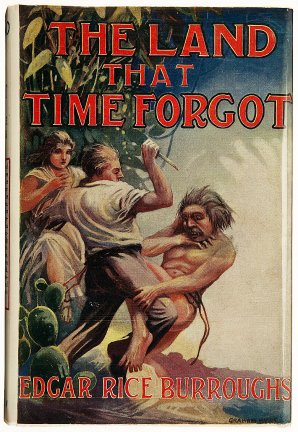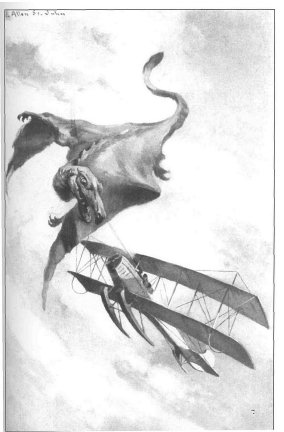.

ERB'S EMBRYONIC JOURNEY:
THE TRIMESTERS OF CASPAK
 
Part Three
by
Woodrow Edgar Nichols, Jr.
(Dedicated to George McWhorter)
THE LAND THAT TIME FORGOT
(Chapters 2-3)
B. Bowen Tyler, Jr. (continued)
Bowen Tyler is back in charge of his Frankenstein, the U-33, slayer
of defenseless women and children. Tyler may know best how to handle the
sub, but he knows absolutely nothing about wartime intrigue or good leadership.
Note the almost brainless assumption that everything he does is right as
he describes the situation:
“Immediately I was put in command, and
the first thing I did was to go below with Olson and inspect the craft
thoroughly for hidden boches and damaged machinery. There were no Germans
below, and everything was intact and in shipshape working order. I then
ordered all hands below except one man who was to act as lookout. Questioning
the Germans, I found that all except the commander were willing to resume
their posts and aid in bringing the vessel into an English port. I believe
that they were relieved at the prospect of being detained at a comfortable
English prison-camp for the duration of the war after the perils and privations
through which they had passed. The officer, however, assured me that he
would never be a party to the capture of his vessel.” (LTF/2.)
I believe ERB knew perfectly what he was doing when he wrote that, for
what bold stupidity. He must have loved playing the fool as the first person
narrator. Oh, what mischief! Don’t you just feel like knocking Bowen on
the head with your fist and yelling, “Hello! Are you crazy? Taking the
assurance of the commanding officer! After all, these Germans are war criminals!
Bowen and the girl are witnesses to this fact. The main duty of the Germans
when captured is to escape. Giving your word doesn’t count in this kind
of situation. As long as their commander is in irons, each one of those
Germans has to worry about future retaliation. At the first chance of escape,
they won’t even hesitate to rally around their commander.
But what is Bowen thinking? Oh, they are tired of the war and long for
the luxury of a British prison camp. But this is only the beginning of
a long run of stupidity, which makes the reading audience smarter than
the first person narrator. ERB knew that this was a well-known literary
technique to create suspense. Anyone with foresight could have seen what
foolish things Bowen was doing. The reader now understands that he or she
is between a rock and hard place ... no, no, don’t go up those spooky stairs!....no,
no, don’t go down into that dark basement!.. watch out!... don’t you dare
open that door! And yet one finds onself compelled to read on.
“There was, therefore, nothing to do
but put the man in irons. As we were preparing to put this decision into
force, the girl descended from the deck. It was the first time that she
or the German officer had seen each other’s faces since we had boarded
the U-boat. I was assisting the girl down the ladder and still retained
a hold upon her arm – possibly after such support was no longer necessary
– when she turned and looked squarely into the face of the German. Each
voiced a sudden exclamation of surprise and dismay.
“‘Lys!’ he cried, and took a step toward her.
“The girl’s eyes went wide, and slowly filled
with a great horror, as she shrank back. Then her slender figure stiffened
to the erectness of a soldier, and with chin in air and without a word
she turned her back upon the officer.
“‘Take him away,’ I directed the two men who
guarded him, ‘and put him in irons.’
“When he had gone, the girl raised her eyes to
mine. ‘He is the German of whom I spoke,’ she said. ‘He is Baron von Schoenvorts.’
“I merely inclined my head. She had loved him!
I wondered if in her heart of hearts she did not love him yet. Immediately,
I became insanely jealous. I hated Baron von Schoenvorts with such utter
intensity that the emotion thrilled me with a species of exaltation.” (LTF/2.)
And so the buffoonery continues. Note the fact that his insane jealousy
created a feeling of exaltation, like a cocaine brain rush. But not to
fear. ERB is not going to let this spoiled rich kid, Bowen Tyler, Jr.,
escape such folly for long.
Now we come to a series of misadventures for which only the erratic
command of Bowen Tyler can be blamed. Bowen is told that a ship approaches.
He hoists the Union Jack over the sub, totally ignorant that this is one
of the oldest ruses on the open seas. For when the ship is within firing
range, you quickly strike the Union Jack and raise the German flag. But,
oh, well, live and learn.
The ship turns away after sighting the U-boat – they have a specific
profile – and Bowen begins to realize getting the sub into an English or
French port is a perilous enterprise. Next they encounter a Bristish war
vessel, with equal luck, they just barely escape being shelled and sunk.
Hmm, do you think Bowen might have first thought about using the wireless?
Of course, by the time he gets around to seeing the obvious it will be
too late.
“Bradley was at my side. He looked at
me quizzically.
“‘What the devil are we to do?’ he asked. ‘The
merchantmen will flee us; the war-vessel will destroy us; neither will
believe our colors or give us a chance to explain. We will meet even a
worse reception if we go nosing around a British port – mines, nets and
all of it. We can’t do it.’
“‘Let’s try it again when this fellow has lost
the scent,’ I urged. ‘There must come a ship that will believe us.’
“And try it again we did, only to be almost rammed
by a huge freighter. Later we were fired upon by a destroyer, and two merchantmen
turned and fled at our approach. For two days we cruised up and down the
Channel trying to tell some one, who would listen, that we were friends;
but no one would listen. After our encounter with the first warship I had
given instructions that a wireless message be sent out explaining our predicament;
but to my chagrin I discovered that both sending and receiving instruments
had disappeared.
“‘There is only one place you can go,’ von Schoenvorts
sent word to me, ‘and that is Kiel. You can’t land anywhere else in these
waters. If you wish, I will take you there, and I can promise that you
will be treated well.’
“‘There is another place we can go,’ I sent back
my reply, ‘and we will before we’ll go to Germany. That place is hell.’”
(LTF/2.)
Did a light bulb suddenly go on over Bowen’s head! No. Did he think about
putting a round the clock guard on von Schoenvorts to make sure no one
was in contact with him? No.
For surely a rational commander would have immediately thought: How
in the hell does von Schoenvorts know what our situation is? Who has he
been talking to? I mean, come on.... he has solid evidence that a saboteur
is aboard and free on his ship. A little investigation should have told
Bowen the time period in which the wireless disappeared. Who had access
to it at that time? This is elementary, isn’t it, my dear Watson?
One is almost embarrassed to have Bowen being the one telling this story.
How Bowen is constantly misled in the events to come when the truth is
staring him in front of his face, is part of the writing genius of ERB.
Sooner or later we will get to Caspak, but we are no closer as Chapter
Three begins. They stay on the surface and leave British waters behind,
sailing out into the broad Atlantic, chasing off as many boats as they
sight. Chapter Three is untitled, but it could just as easily have been
titled “A Series of Unfortunate Events.” The first is the premeditated
attempted murder of Bowen and the entire crew:
“One of the Diesel engines broke down
in the morning, and while we were working on it, the forward port diving-tank
commenced to fill. I was on deck at the time and noticed the gradual list.
Guessing at once what was happening, I leaped for the hatch and slamming
it closed above my head, dropped to the centrale. By this time the craft
was going down by the head with a most unpleasant list to port, and I didn’t
wait to transmit orders to some one else but ran as fast as I could for
the valve that let the sea into the forward port diving-tank. It was wide
open. To close it and to have the pump started that would empty it were
the work of but a minute; but we had had a close call.
“I knew that the valve had never opened itself.
Some one had opened it – some one who was willing to die himself if he
might at the same time encompass the death of all of us.
“After that I kept a guard pacing the length
of the narrow craft. We worked upon the engine all that day and night and
half the following day.” (LTF/3.)
Bowen is unbelievable. Working on the engine is more important than finding
the saboteur. Again, how many men had access to the valve when it could
have been opened? I reckon not too many. He only takes protective measures
after the fact. Look at what happens next:
“Most of the time we drifted idly upon
the surface, but toward noon we sighted smoke due west, and having found
that only enemies inhabited the world for us, I ordered that the other
engine be started so that we could move out of the path of the oncoming
steamer. The moment the engine started to turn, there was a grinding sound
of tortured steel, and when it had been stopped, we found that some one
had placed a cold-chisel in one of the gears.” (LTF/3.)
Again, there is no investigation. The fact that no guard was put on the
second engine after the first one broke down is staggering. Didn’t anyone
think that the first breakdown was an act of sabotage? One cannot overemphasize
this fact. They are in a small craft in the middle of the ocean. Without
engines they are as good as dead.
Then ERB introduces us to the cold intrigue on board the ship. Since
Bowen hasn’t investigated any of the events, he has had no opportunity
to get any ideas other than his own. So the first person who has an idea
is believed on the spot without hesitation:
“It was another two days before we were
ready to limp along, half repaired. The night before the repairs were completed,
the sentry came to my room and awoke me. He was rather an intelligent fellow
of the English middle class, in whom I had much confidence.
“‘Well, Wilson,’ I asked, ‘what’s the matter
now?’
“He raised his finger to his lips and came closer
to me. ‘I think I’ve found out who’s doin’ the mischief,’ he whispered,
and nodded his head toward the girl’s room. ‘I seen her sneakin’ from the
crew’s room just now,’ he went on. ‘She’d been in gassin’ wit’ the boche
commander. Benson seen her in there last night, too, but he never said
nothin’ till I goes on watch tonight. Benson’s sorter slow in the head,
an’ he never puts two an’ two together till some one else has made four
out of it.’
“If the man had come in and struck me suddenly
in the face, I could have been no more surprised.
“‘Say nothing of this to anyone,’ I ordered.
‘Keep your eyes and ears open and report every suspicious thing you see
or hear.’
“The man saluted and left me; but for an hour
or more I tossed, restless, upon my hard bunk in an agony of jealousy and
fear. Finally I fell into a troubled sleep.” (LTF/3.)
Gee, surely by now the idea of a guard on von Schoenvorts would have presented
itself into even the most dense brain. Oh, no, better to suspect the woman
you love, the woman you saved from the sea, the woman who told you she
did not want to die, who wanted to live to seek vengeance for the barbaric
atrocities of von Schoenvorts. Yes, forget all of that and focus on the
idea that she has betrayed you instead. And on whose word? Wilson’s! a
man Bowen has great confidence in. Hehehehe. Isn’t that the kiss of death
for the delusional! But, hey, don’t underestimate the stupidity that Bowen
still has in store:
“It was daylight when I awoke. We were
steaming along slowly upon the surface, my orders having been to proceed
at half speed until I could take an observation and determine our position.
The sky had been overcast all the previous day and all night; but as I
stepped into the centrale that morning I was delighted to see that the
sun was again shining. The spirits of the men seemed improved; everything
seemed propitious. I forgot at once the cruel misgivings of the past night
as I set to work to take my observations.
“What a blow awaited me! The sextant and chronometer
had both been broken beyond repair, and they had been broken upon the night
that Lys had been seen talking with von Schoenvorts. I think that it was
this last thought which hurt me the worst. I could look the other disaster
in the face with equanimity; but the bald fact that Lys might be a traitor
appalled me.” (LTF/3.)
The fact that he is even going through this mental struggle attests to
how successful his mind is being manipulated. He calls Bradley and Olson
on deck and tells them about the conversation with von Schoenvorts. Bradley
assures Bowen that they have extra instruments and when Bowen tells him
that they too are missing, Olson states,
“We still have the compass and the sun....
They may be after getting the compass some night; but they’s too many of
us around in the daytime fer ‘em to get the sun.” (LTF/3.)
Then Bowen spies an opportunity to investigate Wilson’s claims:
“It was then that one of the men stuck
his head up through the hatchway and seeing me, asked permission to come
on deck and get a breath of fresh air. I recognized him as Benson, the
man who, Wilson had said, reported having seen Lys with von Schoenvorts
two nights before. I motioned him on deck and then called him to one side,
asking if he had seen anything out of the way or unusual during his trick
on watch the night before. The fellow scratched his head a moment and said,
“No,’ and then as though it was an afterthought, he told me that he had
seen the girl in the crew’s room about midnight talking with the German
commander, but as there hadn’t seemed to him to be any harm in that, he
hadn’t said anything about it. Telling him never to fail to report to me
anything in the slightest out of the ordinary routine of the ship, I dismissed
him.” (LTF/3.)
Bowen had already dismissed Wilson’s allegation from his mind since it
was impossible for the girl to have slipped through the room in which he
and Bradley slept in order to get into the crew’s room without being seen
by anyone. Yet, here is Benson confirming that very impossibility. But
does Bowen now have two suspicious series of events to ponder? No. He still
is left with only the option of Lys being a traitor. The fact that Wilson
and Benson could be in collusion never enters his mental field.
Bowen’s also got some real problems with women which are exposed the
moment he tries to be “subtle” about the situation with Lys:
“Several of the other men now asked permission
to come on deck, and soon all but those actually engaged in some necessary
duty were standing around smoking and talking, all in the best of spirits.
I took advantage of the presence of the men upon the deck to go below for
my breakfast, which the cook was already preparing upon the electric stove.
Lys, followed by Nobs, appeared as I entered the centrale. She met me with
a pleasant ‘Good morning!’ which I am afraid I replied to in a tone that
was rather constrained and surly.
“‘Will you breakfast we me?’ I suddenly asked
the girl, determined to commence a probe of my own along the lines which
duty demanded.
“She nodded a sweet acceptance of my invitation,
and together we sat down at the little table of the officers’ mess.
“‘You slept well last night?’ I asked.
“‘All night,’ she replied. ‘I am a splendid sleeper.’
“Her manner was so straightforward and honest
that I could not bring myself to believe in her duplicity; yet – Thinking
to surprise her into a betrayal of her guilt, I blurted out: ‘The chronometer
and sextant were both destroyed last night; there is a traitor among us.’
But she never turned a hair by way of evidencing guilty knowledge of the
catastrophe.
“‘Who could it have been?’ she cried. ‘The Germans
would be crazy to do it, for their lives are much at stake as ours.’” (LTF/3.)
Does he listen to her common sense analysis? No. He thinks he can still
trap her into an admission, the folly of every police officer. In doing
so, he blunders in a spectacular fashion. He not only tips her off that
he is on to her if she is guilty, but he most certainly ruins any chance
at a romance if she is innocent. One almost detects a perverse anger at
Lys for making him feel jealous:
“‘Men are often glad to die for an ideal
– an ideal of patriotism, perhaps,’ I replied; ‘and a willingness to martyr
themselves includes a willingness to sacrifice others, even those who love
them. Women are much the same, except that they will go even further than
most men – they will sacrifice everything, even honor, for love.’
“I watched her face carefully as I spoke, and
I thought that I detected a very faint blush mounting her cheek. Seeing
an opening and an advantage, I sought to follow it up.
“‘Take von Schoenvorts, for instance,’ I continued:
‘he would doubtless be glad to die and take us all with him, could he prevent
in no other way the falling of his vessel into enemy hands. He would sacrifice
anyone, even you; and if you still love him, you might be his ready tool.
Do you understand me?’” (LTF/3.)
How lame can you get? It seems that Bowen is using his ludicrous ploy more
to discover if Lys still loved the German lieutenant rather than to uncloak
a traitor. Is it any wonder that she reacted the way in which she did?
“She looked at me in wide-eyed consternation
for a moment, and then she went very white and rose from her seat. ‘I do,’
she replied, and turning her back upon me, she walked quickly toward her
room. I started to follow, for even believing what I did, I was sorry that
I had hurt her. I reached the door to the crew’s room just behind her and
in time to see von Schoenvorts lean forward and whisper something to her
as she passed; but she must have guessed that she might be watched, for
she passed on.” (LTF/3.)
A gale approaches; both Bradley and Olson are sick. Bowen stays at his
post for 24 hours until he is too exhausted to continue. He looks for a
volunteer to relieve him.
“Benson volunteered. He had not been
sick, and assured me that he was a former R.N. man and had been detailed
for submarine duty for over two years. I was glad that it was he, for I
had considerable confidence in his loyalty, and so it was with feeling
of security that I went below and lay down.” (LTF/3.)
Okay, let’s see here: Bowen believes Wilson, ‘in whom I had much confidence,’
and further trusts Benson, “for I had considerable confidence in his loyalty.”
What more can be said? He gets 12 hours of shuteye and muses how fast the
sub can travel in their westerly course. But six days later they appear
no closer to the North American shore than ever. On the seventh day it
clears up and they witness the odd fact that the sun is rising in the south
and not in the east... or so it appears. Wouldn’t you know it: someone
has tampered with the compass!
Bowen makes a crude sextant and discovers that they are 2,500 miles
off course. They have traveled due south for six days. Now they are almost
out of oil, but fortunately, they come across a sailing ship, the Balmen
of Halmstad, Sweden, with general cargo from Brazil for Spain.
After an appeal for oil is turned down, Bowen has to train his guns
on her to get her to comply with his request for aid. Finally, Bowen is
showing signs of true command.
Well, almost. It seems that during the showdown, six of Bowen’s loyal
crew had come on deck to serve the gun, and as they descend back into the
centrale, they discover that the Germans have once again seized command
of the vessel.
“I was the last one to come, and when
I reached the bottom, I found myself looking into the muzzle of a pistol
in the hands of Baron Friedrich von Schoenvorts – I saw all my men lined
up at one side with the remaining eight Germans standing guard over them.
“I couldn’t imagine how it happened; but it had.
Later I learned that they had first overpowered Benson, who was asleep
in his bunk, and taken his pistol from him, and then had found it an easy
matter to disarm the cook and the remaining two Englishmen below. After
that it had been comparatively simple to stand at the foot of the ladder
and arrest each individual as he descended.
“The first think von Schoenvorts did was to send
for me and announce that as a pirate I was to be shot early the next morning.
Then he explained that the U-33 would cruise in these waters for a time,
sinking neutral and enemy shipping indiscriminately, and looking for one
of the German raiders that was supposed to be in these parts.” (LTF/3.)
Yeah, Bowen, you sure guessed right about these guys being war-weary! They
cruise the waters sinking many vessels. Bowen feels lucky that he is not
shot the next day, but voices surprise over the fact that von Schoenvorts
often permits Benson to take command. Well, at least he is puzzled.
They round the Horn, then enter the South Pacific. Bowen, now in irons,
sees Lys once or twice passing by, and once she appeared as if she wanted
to say something to him, but the fool does not respond so she walks on
by.
“The very first day we entered the South
Pacific we had an adventure. It turned out to be quite the most exciting
adventure I had ever encountered. It fell about this way. About eight bells
of the forenoon watch I heard a hail from the deck, and presently the footsteps
of the entire ship’s company, from the amount of noise I heard at the ladder.
Some one yelled back to those who had not reached the level of the deck:
‘It’s the raider, the German raider Geier!’
“I saw that we had reached the end of our rope.
Below all was quiet – not a man remained. A door opened at the end of the
narrow hull, and presently Nobs came trotting up to me. He licked my face
and rolled over on his back, reaching for me with his big, awkward paws.
Then other footsteps sounded, approaching me. I knew whose they were, and
I looked straight down at the flooring. The girl was coming almost at a
run – she was at my side immediately. ‘Here!’ she cried.
‘Quick!’ And she slipped something into my hand.
It was a key – the key to my irons. At my side she also laid a pistol,
and then she went on into the centrale. As she passed me, I saw that she
carried another pistol for herself. It did not take me long to liberate
myself, and then I was at her side. ‘How can I thank you?’ I started; but
she shut me up with a word.
“‘Do not thank me,’ she said coldly. ‘I do not
care to hear your thanks or any other expression from you. Do not stand
there looking at me. I have given you a chance to do something – now do
it!’ The last was a peremptory command that made me jump.” (LTF/3.)
Is Bowen really this dull and dense? Her harsh orders finally get through
his thick skull, allowing ERB to return to writing another rousing action
sequence:
“Glancing up, I saw that the tower was
empty, and I lost no time in clambering up, looking about me. About a hundred
yards off lay a small, swift cruiser-raider, and above her floated the
German man-of-war’s flag. A boat had just been lowered, and I could see
it moving toward us filled with officers and men. The cruiser lay dead
ahead. ‘My,’ I thought, ‘what a wonderful targ –’
“I stopped even thinking, so surprised and shocked
was I by the boldness of my imagery. The girl was just below me. I looked
down on her wistfully. Could I trust her? Why had she released me at this
moment? I must! I must! There was no other way. I dropped back below. ‘Ask
Olson to step down here, please,’ I requested; ‘and don’t let anyone see
you ask him.’
“She looked at me with a puzzled expression on
her face for the barest fraction of a second, and then she turned and went
up the ladder. A moment later Olson returned, and the girl followed him.
‘Quick!’ I whispered to the big Irishman, and made for the bow compartment
where the torpedo-tubes are built into the boat; here, too, were the torpedoes.
The girl accompanied us, and when she saw the thing I had in mind, she
stepped forward and lent a hand on the swinging of the great cylinder of
death and destruction into the mouth of its tube. With oil and main strength
we shoved the torpedo home and shut the tube; then I ran back to the conning-tower,
praying in my heart of hearts that the U-33 had not swung her bow away
from the prey. No, thank God!
“Never could aim have been truer. I signaled
back to Olson: ‘Let ‘er go!’ The U-33 trembled from stem to stern as the
torpedo shot from its tube. I saw the white wake leap from her bow straight
toward the enemy cruiser. A chorus of hoarse yells arose from the deck
of our own craft: I saw officers stand suddenly erect in the boat that
was approaching us, and I heard loud cries and curses from the raider.
Then I turned my attention to my own business. Most of the men were standing
in paralyzed fascination, staring at the torpedo. Bradley happened to be
looking toward the conning-tower and saw me. I sprang on deck and ran toward
him. ‘Quick!’ I whispered. ‘While they are stunned, we must overcome them.’
“A German was standing near Bradley – just in
front of him. The Englishman struck the fellow a frantic blow upon the
neck and at the same time snatched his pistol from its holster. Von Schoenvorts
had recovered from his first surprise quickly and had turned toward the
main hatch to investigate. I covered him with my revolver, and at the same
instant the torpedo struck the raider, the terrific explosion drowning
the German’s command to his men.
“Olson was below, so that there were only nine
of us against eight Germans, for the man Bradley had struck still lay upon
the deck. Only two of us were armed; but the heart seemed to have gone
out of the boches, and they put up but half-hearted resistance. Von Schoenvorts
was the worst – he was fairly frenzied with rage and chagrin, and he came
charging for me like a mad bull, and as he came he discharged his pistol.
If he’d stopped long enough to take aim, he might have gotten me; but his
pace made him wild, so that not a shot touched me, and then we clinched
and went to the deck. This left two pistols, which two of my own men were
quick to appropriate. The Baron was no match for me in hand-tohand encounter,
and I soon had him pinned to the deck and the life almost choked out of
him.
“A half-hour later things had quieted down, and
all was much the same as before the prisoners had revolted – only we kept
a much closer watch on von Schoenvorts. The Geier had sunk while we were
still battling upon our deck, and afterward we had drawn away toward the
north, leaving the survivors to the attention of the single boat which
had been making its way toward us when Olson launched the torpedo. I suppose
the poor devils never reached land, and if they did, they most probably
perished on that cold and unhospitable shore; but I couldn’t permit them
aboard the U-33. We had all the Germans we could take care of.” (LTF/3.)
Bowen seems to be learning slowly the ways of war. Why he leaves von Schoenvorts
aboard, though, is anyone’s guess. I would have deep-sixed the bastard
without further thought.
Anyway, they head to San Diego. That night Bowen gets a chance to talk
to Lys:
“Lys stood with a heavy blanket wrapped
around her slender figure, and as I approached her, she half turned toward
me to see who it was. When she recognized me, she immediately turned away.
“‘I want to thank you,’ I said, ‘for your bravery
and loyalty – you were magnificent. I am sorry that you had reason before
to think that I doubted you.’
“‘You did doubt me,’ she replied in a level voice.
‘You practically accused me of aiding Baron von Schoenvorts. I can never
forgive you.’
“There was a great deal of finality in both her
words and tone. “‘I could not believe it,’ I said; ‘and yet two of my men
reported having seen you in conversation with von Schoenvorts late at night
upon two separate occasions – after each of which some great damage was
found done us in the morning. I didn’t want to doubt you; but I carried
all the responsibility of the lives of these men, of the safety of the
ship, of your life and mine. I had to watch you, and I had to put you on
your guard against a repetition of your madness.’
“She was looking at me now with those great eyes
of hers very wide and round.
“‘Who told you that I spoke with Baron von Schoenvorts
at night, or any other time?’ she asked.
“‘I cannot tell you, Lys,’ I replied, ‘but it
came to me from two different sources.’
“‘Then two men have lied,’ she asserted without
heat. ‘I have not spoken to Baron von Schoenvorts other than in your presence
when first we came aboard the U-33. And please, when you address me, remember
that to others than my intimates I am Miss La Rue.’
“Did you ever get slapped in the face when you
least expected it? No? Well, then you do not know how I felt at that moment.
I could feel the hot, red flush surging up my neck, across my cheeks, over
my ears, clear to my scalp. And it made me love her all the more; it made
me swear inwardly a thousand solemn oaths that I would win her.” (LTF/3.)
How about first realizing that Wilson and Benson have fooled the hell out
of you?
Anyway, stay tuned for the next installment.
|





![]()

![]()

